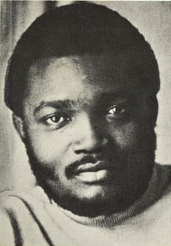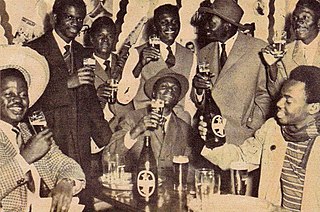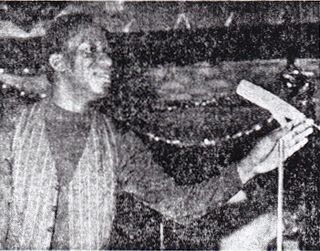
Congolese music is one of the most influential music forms of the African continent. Since the 1930s, Congolese musicians have had a huge impact on the African musical scene and elsewhere. Many contemporary genres of music, such as Kenyan Benga and Colombian Champeta, have been heavily influenced by Congolese music. In 2021, Congolese rumba joined other living traditions such as Jamaican reggae music and Cuban rumba on UNESCO's "intangible cultural heritage of humanity" list.

François Luambo Luanzo Makiadi was a Congolese singer, guitarist, songwriter, bandleader, and cultural revolutionary. He was a central figure in 20th-century Congolese and African music, principally as the bandleader for over 30 years of TPOK Jazz, the most popular and influential African band of its time and arguably of all time. He is referred to as Franco Luambo or simply Franco. Known for his mastery of African rumba, he was nicknamed by fans and critics "Sorcerer of the Guitar" and the "Grand Maître of Zairean Music", as well as Franco de Mi Amor by female fandom. AllMusic described him as perhaps the "big man in African music". His extensive musical repertoire was a social commentary on love, interpersonal relationships, marriage, decorum, politics, rivalries, mysticism, and commercialism. In 2023, Rolling Stone ranked him at number 71 on its list of the 250 Greatest Guitarists of All Time.

OK Jazz, later renamed TPOK Jazz, was a Congolese rumba band from the Democratic Republic of the Congo established in 1956 and fronted by Franco. The group disbanded in 1993, but reformed in 1996.
Sam Mangwana, is a Congolese-born musician, born to Angolan parents. He was the frontman of his bands Festival des Maquisards and African All Stars. Mangwana was a member of François Luambo Makiadi's seminal band TPOK Jazz, and Tabu Ley Rochereau's bands African Fiesta, African Fiesta National and Afrisa International.

Pascal-Emmanuel Sinamoyi Tabu, better known as Tabu Ley Rochereau, was a leading African rumba singer-songwriter from the Democratic Republic of the Congo. He was the leader of Orchestre Afrisa International, as well as one of Africa's most influential vocalists and prolific songwriters. Along with guitarist Dr Nico Kasanda, Tabu Ley pioneered soukous and internationalised his music by fusing elements of Congolese folk music with Cuban, Caribbean and Latin American rumba. He has been described as "the Congolese personality who, along with Mobutu, marked Africa's 20th century history." He was dubbed "the African Elvis" by the Los Angeles Times. After the fall of the Mobutu regime, Tabu Ley also pursued a political career. His musical career ran parallel to the other great Congolese rhumba bandleader and rival Franco Luambo Makiadi who ran the band TPOK Jazz throughout the 1960s, 1970s and '80s.
Joseph Kiambukuta Londa, known as Josky Kiambukuta, was a Congolese performing artist, singer, songwriter and composer. As a member of TPOK Jazz he played alongside Franco during their most popular period in the mid-1960s until the late 1980s.
Jean de Dieu Makiese, popularly known as Madilu System, was a Congolese rumba singer and songwriter, born in what was then Léopoldville, Belgian Congo. He was once a member of the seminal band TPOK Jazz which dominated the Congolese scene from 1960s through 1980s.
Simaro Massiya Lutumba Ndomanueno, known as Simaro, was a Congolese music rhythm guitarist, songwriter, poet, composer, and bandleader. He was a member of the seminal Congo music band TPOK Jazz, which dominated the music scene in the Democratic Republic of the Congo (DRC) from the 1960s to the 1980s.
Ndombe Opetum, popularly known as Pepe Ndombe, was an Odemba recording artist, composer, and vocalist, in the Democratic Republic of the Congo (DRC). He was once a member of the seminal soukous band TPOK Jazz which dominated the Congolese music scene from the 1960s through the 1980s.
Gaspard Wuta Mayi, commonly known as Wuta Mayi, is a Congolese rumba and soukous vocalist and composer from the Democratic Republic of the Congo (DRC). From 1974 to 1982, he was a member of the band TPOK Jazz, led by Franco, which dominated the Congolese music scene from the 1960s through the 1980s. Since leaving TPOK Jazz he has recorded and performed as a solo artist, in addition to being one of the four members of the "supergroup" Les Quatre Etoiles, and subsequently a member of Kékélé.
Michel Boyibanda was a Congolese soukous recording artist, composer, and vocalist. He was once a member of the Congolese Rumba band TPOK Jazz, led by François Luambo Makiadi, which dominated the Congolese music scene from the 1950s through the 1980s.
Lola Djangi Chécain, was a soukous recording artist, composer, and vocalist in the Democratic Republic of the Congo. He was once a member of the soukous band TPOK Jazz, led by François Luambo Makiadi, which dominated the Congolese music scene from the 1950s to the 1980s.
Malage de Lugendo is a Congolese soukous recording artist, composer and vocalist. He was a member of François Luambo Makiadi's seminal band TPOK Jazz, and Tabu Ley Rochereau's band Afrisa International.

Isaac Musekiwa was a Congolese rumba recording artist and saxophonist, in the Democratic Republic of the Congo (DRC). He was once a member of the soukous band TPOK Jazz, led by François Luambo Makiadi, which dominated the Congolese music scene from the 1950s through the 1980s.

Georges Kiamuangana Mateta, known professionally as Verckys, was a Congolese saxophonist, composer, producer, bandleader, and record executive. A significant figure in the evolution of 20th-century Congolese and African popular music, he is referred to as "Verckys", "Vévé", "the man with the iron lungs" and "Wazola Nzimbu". Kiamuangana was the second Congolese artist to establish and independently manage a record label, Éditions Vévé, through which he brought many Congolese musicians to prominence, including Zaïko Langa Langa, Koffi Olomide, Empire Bakuba, Afrisa International, OK Jazz, Langa Langa Stars, Victoria Eleison, Historia Musica, Orchestre Kiam, and others.
Papa Noël Nedule was a soukous recording artist and guitarist in the Democratic Republic of the Congo (DRC).
Mavatiku Michelino Visi, commonly known as Michelino, is a soukous recording artist, composer, guitarist and vocalist, in the Democratic Republic of the Congo (DRC). He was a member of the Congolese band African Fiesta Nationale, which was later renamed Afrisa International, led by Congolese music superstar, Tabu Ley. Later, in the early 1970s, Michelino left Afrisa and joined TPOK Jazz, led by François Luambo Makiadi, which dominated the Congolese music scene from the 1950s through the 1980s.
Gerry Kassia Dialungana, was a Congo music recording artist and solo guitarist, in the Democratic Republic of the Congo (DRC). He was once a member of the soukous band TPOK Jazz, led by François Luambo Makiadi, which dominated the Congolese music scene from the 1950s through the 1980s.

The Statue of Franco Luambo is a 2.97-meter-tall bronze sculpture depicting Congolese rumba musician Franco Luambo designed by Congolese sculptor Alfred Liyolo Limbe M'Puanga. Strategically located in the Kalamu commune at the Place des Artistes, within the Matonge neighborhood, the statue was inaugurated by Prime Minister Matata Ponyo Mapon on 12 October 2015.







